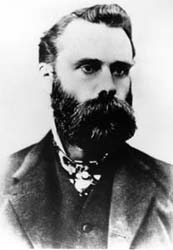1902 – Clarence Barron, owner of the Boston News Bureau and the Financial Journal in Philadelphia , buys The Wall Street Journal.

Charles Dow died in 1902. The newspaper and the ticker operations were sold to the newspaper’s Boston correspondent, Charles Barron, who had his own wire service from his hometown.
Barron had begun writing about financial news for the Boston Evening Transcript, but when he left the paper after a disagreement, he started a news service that delivered bulletins to businessmen on State Street , the Boston equivalent of Wall Street. Like Dow and Jones, he later expanded his news service to a fi`znancial newspaper called The Boston News Bureau, which Barron marketed as the “Financial Bible of New England.” In 1896, he added a business newspaper in Philadelphia called the Financial Journal. When he purchased The Journal in 1902, Barron owned the three largest business newspapers in the country. Their operations were combined, and under Barron the newspaper’s subscriptions grew, from 7,000 to 18,750 in 1920 and to as high as 52,000 in 1928 shortly before his death. Barron also added correspondents in every major American city who regularly sent stories to New York for the newspaper, becoming the first business journalism since the Fugger newsletters in 16 th century Europe to understand the importance of delivering information from a wide geographic region to its readers.